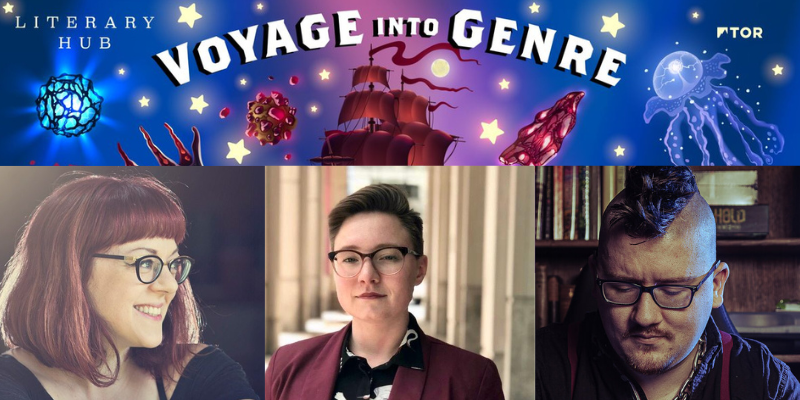No Place Like London: V.E. Schwab, Lina Rather, and Oliver Darkshire
Tor Presents: Voyage Into Genre S03E05
Tor Books, in partnership with Literary Hub, presents Voyage Into Genre! Every other Wednesday, join host Drew Broussard for conversations with Tor authors discussing their new books, the future, and the future of genre. Oh, and maybe there’ll be some surprises along the way…
In the episode, I sing a little Sondheim (as one does) but for this write-up, let’s imagine instead the opening slashing guitar chords of The Clash’s “London Calling” — because that’s exactly what London is doing in this episode. One of my favorite cities in the world and host to some of the most incredible stories ever (fictional and otherwise), let’s take a trip across versions of the Big Smoke that you might recognize — and a few you might not.
This week, V.E. Schwab welcomes us back to her four magical Londons in The Fragile Threads of Power and talks about picking up with old characters, the question of the monarchy, and how she structures her writing. Then, Lina Rather flings us back in time to the days after the Great Fire as she explains how research led her to A Season of Monstrous Conceptions, the wild world of historical midwifery, and how she put Sir Christopher Wren onto the page. Finally, Oliver Darkshire (Once Upon a Tome: The Misadventures of a Rare Bookseller) ponders the longevity of London’s antiquarian bookshops and explains why people who care about one thing are bound to care about others, too.
See you in two weeks,
Drew
Subscribe and download the episode, wherever you get your podcasts!
Read the full episode transcript here.
*
V.E. Schwab on Characters, and What It Was Like Returning to Hers:
I really believe that characters should be written so that you believe that they’re real people, meaning that their existence should not feel contingent upon you reading them.
You should believe that when you finish a story, when you put it down, those characters don’t cease to exist, you are simply no longer invited to follow. Characters, when I write them, even when I finish writing them, they don’t cease to exist for me. They kind of live in my head. I still see things and think, oh, what would Addie think about that? And so I had Kell and Lila and Ry and Alucard just kicking around in there for several years. And so, the question was, okay, I’ve got new characters and a new storyline, but for our existing characters, can I make you believe that they have been there for the seven years that you have not?
I wanted it to feel like coming home. That’s what it is. At the end of the day, getting to write the book, well, I mean, look, getting to write the book was a fraught experience. I thought Addie was gonna be this thing that ruined my career. Like, I was a fantasy writer. And then Addie was this departure, and I was like, what am I doing, this is a disaster.
And then coming from Addie back to Shades, I was like, what am I doing, this is a disaster. So I had all of this anxiety, my biggest fear was that people were gonna say, this is unnecessary, or the last books were better, all these things. And so for me, when I got that out of my head and I sat down to just write, the thing that I experienced overwhelmingly was this joy of coming home. When I finally got to write the first scene where Lila and Kell are shown to us again on this boat, I was like, I’ve missed you!
*
Lina Rather on Some Historical Differences Between Obstetrics and Midwifery:
It’s super fascinating to look at books by men and by women in this period about obstetrics, because the ones done by men have these really weird– I mean, they’re very accurate and very kind of cool illustrations, but it’ll be, um, just a torso of a pregnant woman with, like, the skin peeled back for you to see the uterus.
And then if you go look at the women’s ones, it’s these really strange, like, bottles floating in space with little babies inside them. And you think, like, well, what use could that be? It’s just, like, a weird bottle.
But it’s because it’s trying to teach people who are doing this all by touch. And so you’re not actually going to see the uterus, because you’ll never be allowed inside of an anatomy room, but you will be using your hands to feel inside the body, and so that’s what they’re trying to get across in those illustrations, and it’s a really kind of kinetic way of getting this information across. Although there was actually a woman working at the turn of the 18th century, in France, who invented something called the machine, which was, a stuffed puppet torso the size of a woman with a real pelvis inside that you could have either a doll or potentially, we think, a mummified fetus that you could pull in and out and replicate different birth complications. And that was a real innovation in obstetrical training at the time. So you can imagine, seeing like, oh, here’s the layers of muscle, not super useful. Seeing here’s what it’s going to feel like when you are, you know, delivering this baby or trying to turn a baby, very useful.
*
Oliver Darkshire on Why It Is Actually Cool to Care:
It’s nice when people care about things. And it sounds really silly. But even the sillier the thing, almost the nicer it is. And by caring about rare books, or something else that’s silly like mugs or ceramic honey cake jars which drip suspicious liquids, whatever it is that you care about, by caring about that, by extension you care about something else.
So if you care about your books, you care about the house that they’re in. And your community, and your bookstore, where that comes from, the people who work there. But caring about things is how you fix problems. Because you’re inherently invested in the people that are operating around them.
It’s nihilism and not caring about anything, and being tricked into thinking that everything’s hopeless that is the lie, because then you don’t do anything. But care about little things that don’t seem relevant, and you end up caring about everything else. So, it’s a stepping stone, you know?
______________________
Tor Presents: Voyage into Genre is a co-production with Lit Hub Radio. Hosted by Drew Broussard. Studio engineering + production by Stardust House Creative. Music by Dani Lencioni of Evelyn.




















